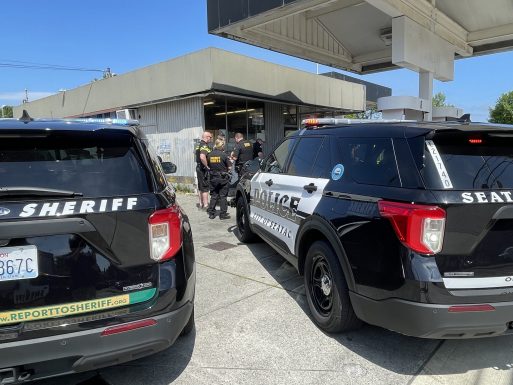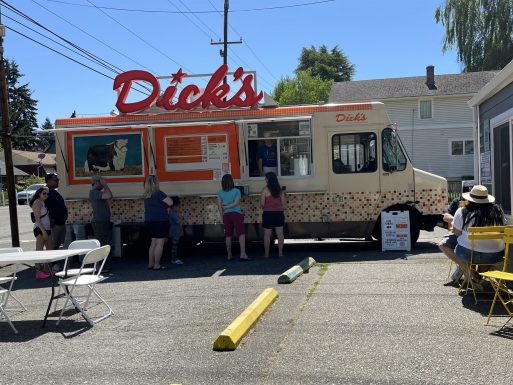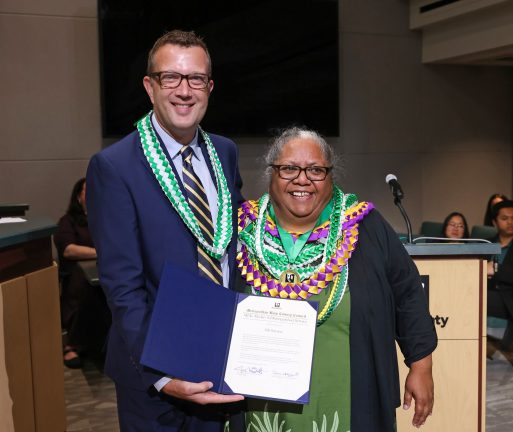(Also published on partner site West Seattle Blog)
 (WCN photo: King County Council District 8 candidates Teresa Mosqueda and Sofia Aragon)
(WCN photo: King County Council District 8 candidates Teresa Mosqueda and Sofia Aragon)
By Tracy Record
White Center Now editor
With ballots going out one month from today, the start of primary-election voting is fast approaching.
Our area’s highest-profile elected local position will be on the primary ballot without an incumbent. Saturday afternoon, the 34th District Democrats held a forum for that race – King County Council District 8 – as a prelude to their endorsement voting this Wednesday.
We recorded video and took as-it-happened notes. Vying for the seat that County Councilmember Joe McDermott is leaving after 13 years are at-large Seattle City Councilmember Teresa Mosqueda and Burien Mayor Sofia Aragon. They shared the stage for 45 minutes at Youngstown Cultural Arts Center in North Delridge. (Participation was limited to candidates eligible for the 34th DDs’ endorsements, as spelled out here; the third candidate who filed for the seat is Goodspaceguy.)
34th DDs’ chair Graham Murphy welcomed attendees and Chris Porter moderated. First, here’s our video:
For those who don’t want to – or have time to – watch the video, we also summarized their replies. Take note that our summaries do not represent everything they said, nor are they direct quotes unless you see words/phrases/sentences within quotation marks. We’re summarizing the questions, too.
First, Porter asked a sort of icebreaker: Name your favorite food in District 8 (which also includes Burien, West Seattle, Vashon Island, and more).
Aragon: Tung Kee Mi Gia.
Mosqueda: Marination.
Then, opening statements.
Aragon: Running because she “wants all county residents to thrive.” She grew up in South Seattle and then her family moved to unincorporated KC for affordable housing. Like her mom, she became a registered nurse. That “taught me to be an advocate for others.” She advocated in Olympia. “Strong public policy creates opportunity.” She took a stand against hate as Burien mayor and works to collaborate with the county. She also tries to promote “respectful debate” on the Burien Council.
Mosqueda: Lives “just four blocks away” (from Youngstown). She spent much of the introduction time talking about endorsements she’s received so far. “They have seen me in action.” She says she is running for this position “to invest in our health” – which she says is a county focus. “We can do more to invest in the health and well-being” of county residents.
Question: Homelessness remains a crisis and hasn’t been effectively addressed. What new solutions will you offer? Are sweeps effective?
Aragon: Burien has an emergency (like other cities). The council is “hands-on.” There’s a “really significant gap in emergency housing.” Burien has promoted some forms of housing but needs more emergency housing, a “transitional place” so people can access services too.
Mosqueda: The solution is “housing and health services.” She touts her track record of housing investments. “The solution is additional housing .. sweeps traumatize people .. we know from human-service providers it’s so difficult to find these folks again” (once swept) and to “get them off the street. The solution is getting people off the street.” She would vote against sweeps as a county councilmember.
Question: The King County Regional Homelessness Authority’s progress has been questioned and it’s in some turmoil. Will you continue to support it (given comments made by its departing CEO)?
Mosqueda: She and other city councilmembers supported creating it. Homelessness is a regional crisis. City has been largest contributor to KCRHA. At county council, she will continue supporting it – investing in the human-service workforce, too, as they are underpaid. That will help ensure “a safety net that is strong.” She also supports tiny houses.
Aragon: She has worked with KCRHA CEO in the Burien situation and appreciates the organization’s availability to help coordinate. “We had great conversations around sanctioned encampments” and (KCRHA CEO Marc) Dones said the data doesn’t show good outcomes from them, so Burien is not supporting them. Many nonprofits are at the table and need better coordination to collaborate.
Followup: Porter recaps Marc Dones’ comments on KCRHA not doing enough on root causes and presses for the candidates’ observations on that.
Mosqueda: “Systemic racism is absolutely part of the reason” for homelessness and low pay for human-service providers. A “disproportionate number of people of color are homeless.” Unable to build generational wealth. “That’s why housing instability is so prevalent among people of color.”
Aragon: “Unhoused peopole are at a crisis in their lives and we have to think about what are the factors that put them there.” That “goes back to education, jobs” … she teaches about health as a registered nurse, and notes that “community conditions” and behaviors have a great effect too. She appreciates Dones’s comments.
Question: Housing is increasingly unaffordable in KC. What needs to change to make more affordable housing, especially for people making under $20 an hour?
Aragon: “There’s been a lot of progress in standing up affordable housing … (they’re using) four models in Burien” including equity building with Habitat and ecoTHRIVE. Current legislation to maximize land we have, two or three houses instead of one per lot.
Mosqueda: Housing has been unaffordable for years for 2/3 of King County households. This is a crisis. More people need to be able to live near where they work. She asked a West Seattle business owner who “looked at a parking lot across the street’ and told her it should be housing so their workers could be close. Market not picking up housing for 0 to 50 percent mean income. Incentives for density.
Question: Seattle, Tukwila, Seatac have higher minimum wages (than state/federal). What should the minimum be in KC including unincorporated areas?
Mosaueda: While working as a labor advocate, she worked for years on the minimum-wage issue. Touts track record to support those increases. That supports businesses and local economy. KC doesn’t necessarily have jurisdiction to raise everywhere but hopes for investments in good economic opportunities for all. The county itself also should be a good employer.
Aragon: We need to secure a living wage for everyone. Everyone needs to be at the table when we talk about this. Burien for example is mostly small businesses. Need to discuss how to get to living wage.
Followup: (since neither had directly named a number) What would that wage be?
Mosqueda: Get it closer to $20. Even in Seattle, the minimum is not keeping page with inflation. We should look at the “actual minimum” right now, which is actually more like $35.
Aragon: (still not naming a sum) She’s running a nonprofit as executive director. She appreciates unions speaking to elected leaders.
Question: Earlier this week, the Seattle City Council voted down a proposal to match city law with the state’s new drug-possession law, with Mosaueda among the “no” votes. King County Prosecutor is not going to prosecute. How should these cases be addressed?
Aragon: I’ve had conversations. “We want a uniform policy across the state. It is inefficient and creates gaps when one entity is different.” Public safety is local government’s job. “We need to do everything we can to address this epidemic.”
Mosqueda: There does need to be unanimity across the state. But the city does not have to mirror that. Three examples in recent history where state made changes in gross misdemeanor and cities didn’t have to change their laws. Need to have a dialogue with prosecutor. We have better return on our investment “when we treat addiction like the public-health crisis it is.”
Followup: Years ago, then-Seattle City Attorney Pete Holmes put out a statement that the city would deprioritize marijuana enforcement. Remaining tickets still mostly went to black/brown folks. Does that disturb you?
Aragon: We’re talking about bias in the system. During COVID, that was a factor too. “We have to work as a county to root out what that bias is.”
Mosqueda: The reason she voted no is “precisely because of the disproportionate affects on people of color. Addiction affects people who are housed and unhoused.” But the legislation was just to target open public consumption, so it would only have exacerbated effects on POC. The solution is harm reduction.
Question: What is your biggest environmental concern in KC and what about the disproportionate effects of climate-change/environmental problems on BIPOC people?
Mosqueda: Cars are the biggest problem. For housing I am concerned with people being able to get to work without using cars. Focused on building affordable housing closer to work. More ways to help people get around without cars, even to visit places like Vashon. Wants to increase access to Water Taxi all day long.
Aragon: Burien was one of the first cities to pass a climate action plan. Carbon emissions come from homes too. We are prioritizing funding to help people modernize – heat pumps, for example. Promoting electric cars. Just launched RapidRide H Line. Need to really understand impact of environmental problems on human health. Burien is an airport community. Must be aware of impact That’s why we preserve greenspaces.
Last question: How can Public Health – Seattle & King County prepare for next pandemic?
Aragon: As a smaller city of 52,000 people, Burien pushed to make sure there’s data for all communities and which strategies worked. Pop-up clinics became important. She serves on governor’s Public Health Advisory Board, first time a city rep has been involved. “We need to look really hard at public-health system …” to be sure it truly promotes equity.
Mosqueda: Health is her passion in public policy. “We were on the front line across the globe” during the pandemic. “We had made investments in an actual footprint …. that model served us very well” … she’ll
invest in expanding PHSKC footprint for more services. She wants to see a Public Health District.
Then, closing statements.
Aragon: The unincorporated area where she lived long ago is actually modern day Issaquah and Sammamish. Investment can determine whether “area thrives or simply survives.” Role of local government is public safety, public health, prevention
Mosqueda: She wants to move to county council to focus on directly investing in publiv health – committed that “every single piece of policy … I will continue to prioritize the social determinantns of health” – economic resilience for small businesses, workers with good living wage jobs
34th District Democrats members will vote on their endorsements Wednesday. If you’re not registered to vote yet, there’s plenty of time – here’s how.


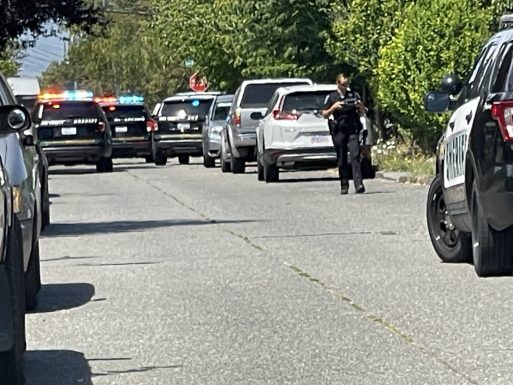
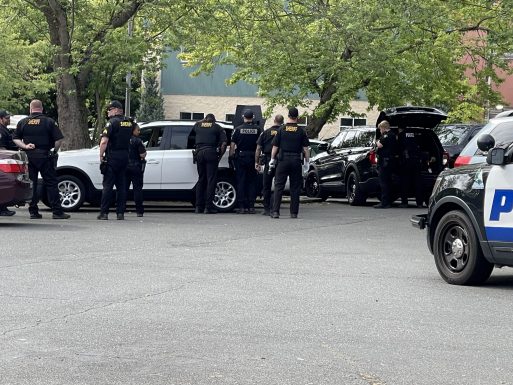

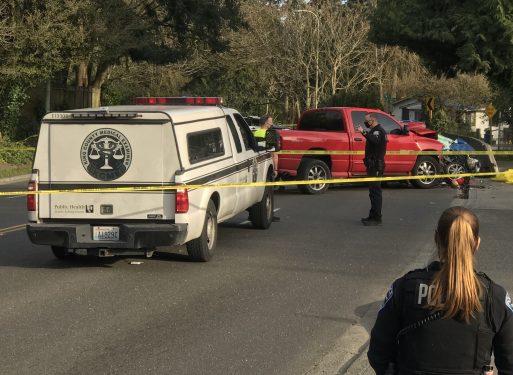
 Family and friends want to remind all those who knew and loved Leticia Martinez that the community celebration of her life is tomorrow (Saturday, July 1st) in West Seattle. All are welcome at
Family and friends want to remind all those who knew and loved Leticia Martinez that the community celebration of her life is tomorrow (Saturday, July 1st) in West Seattle. All are welcome at 